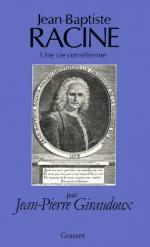|
This section contains 2,203 words (approx. 8 pages at 300 words per page) |

|
SOURCE: "The Poetry of Racine," translated by Raffaello Piccoli, in The Dial, Chicago, Vol. LXXXIV, No. 6, June, 1928, pp. 483-88.
An Italian educator, philosopher, and author, Croce developed a highly influential theory of literary creation and a concomitant critical method. In defining the impetus and execution of poetry, Croce conceives of the mind as capable of two distinct modes of thought, which he terms cognition and volition. Cognition mental activity is theoretical and speculative, while volition is the mind's practical application of ideas originating in the cognitive realm. For Croce, a poem, as an intuitive creation, belongs to the cognitive sphere, and exists within a poet's mind as a complete, independent, and unified image. In his view, the original conception of a poem must be motivated by a dominant emotion, and this emotion must be clearly and effectively translated into the actual poem if the work is to succeed...
|
This section contains 2,203 words (approx. 8 pages at 300 words per page) |

|


